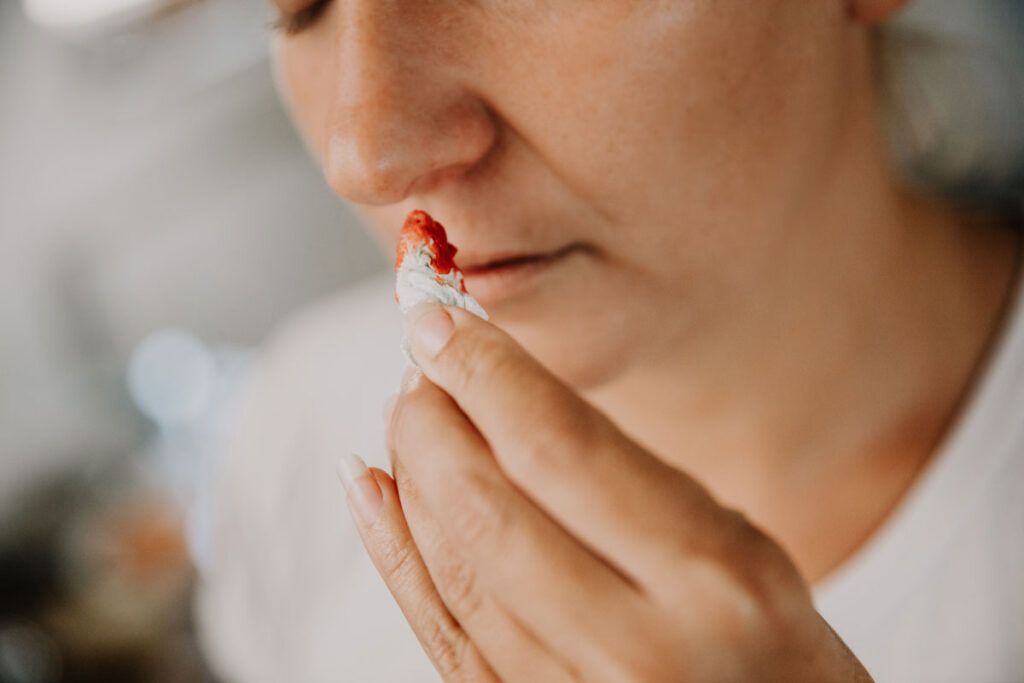Vitamin K plays a key role in keeping your bones and heart healthy. It also helps your blood to clot. If you have a severe deficiency in this nutrient, it can lead to excessive bleeding and put you at an increased risk for bruising. However, this is extremely rare.
Bleeding due to vitamin K deficiency typically occurs because of an underlying medical condition that affects fat absorption, such as biliary disease, cystic fibrosis, or celiac disease. It can also be due to taking certain medications that change how your body breaks down vitamin K.
What are the symptoms of vitamin K deficiency bleeding?

If you develop bleeding from vitamin K deficiency, you may experience the following symptoms:
- blood coming out of a cut, puncture, or incision that usually wouldn’t bleed
- nosebleed
- gastrointestinal hemorrhage
- blood in the urine
- heavy menstrual bleeding
What can cause vitamin K deficiency bleeding?
Vitamin K deficiency occurs in 8–31% of healthy adults. A 2017 study looking at 4,275 people found 31% had vitamin K deficiency.
Although vitamin K deficiency does occur in adults, it rarely causes bleeding. Inadequate dietary vitamin K intake alone usually does not cause symptoms.
If an adult does have vitamin K deficiency bleeding, it’s usually due to a medical cause. Since vitamin K is fat soluble, conditions that affect the body’s ability to absorb fat can lead to less vitamin K, which can cause bleeding. Such conditions include:
- celiac disease
- inflammatory bowel disease
- cystic fibrosis
- resection of the small intestine
- liver disease
- blockage of the bile duct system
Certain medications and supplements can also increase the risk of bleeding. These include:
- blood thinners like warfarin (Coumadin)
- cephalosporins and other broad-spectrum antibiotics
- salicylates like aspirin
- high doses of vitamin E
Blood thinners like warfarin can change how the body processes vitamin K. Since gut bacteria are also essential for how you process vitamin K, antibiotics that reduce the volume of these bacteria can also lead to less vitamin K.
People who have had bariatric surgery might also have low vitamin K levels, but it might not cause signs like excessive bleeding. These individuals may have regular vitamin K checks to make sure they have enough of the nutrient.
What foods can increase vitamin K in the body?
There are two types of vitamin K you can get through your diet:
- Vitamin K1 — also known as phylloquinone — which is mostly found in green leafy vegetables.
- Vitamin K2, which is from a series of compounds called menaquinones, is mainly found in animal-based and fermented foods.
The recommended daily intake of vitamin K for adults ages 19 and over is 120 micrograms (mcg) for males and 90 mcg for females or those who are pregnant or nursing.
Foods that contain vitamin K and the suggested amounts per serving include:
- Natto: 3 ounces provides 850 mcg
- Collards: ½ cup contains 530 mcg
- Turnip greens: ½ cup provides 426 mcg
- Spinach: 1 cup contains 145 mcg
- Kale: 1 cup provides 113 mcg
- Broccoli: ½ cup contains 110 mcg
- Soybeans: ½ cup provides 43 mcg
The amount of vitamin K your body gets from food can vary, as different foods offer different levels of bioavailability for vitamin K. Bioavailability is the amount of a substance, such as a certain food or drug, that is absorbed into your body. In the United States, the most common food sources of vitamin K are:
- spinach
- broccoli
- iceberg lettuce
- soybean oil
- canola oil
Research on bioavailability is limited, but eating vegetables with a small amount of fat might improve vitamin K absorption.
Treatment options
Before a doctor recommends a treatment, they will check for the underlying cause. If you are at increased risk for vitamin K deficiency and have abnormal bleeding, a doctor will test your blood clotting factors.
Among the tests a doctor might run is a prothrombin time test with an INR (PT/INR). Prothrombin is a blood clotting factor and is a protein your liver makes. The PT/INR tests how quickly your blood clots.
If your blood clotting is slow, a doctor can confirm the vitamin K deficiency diagnosis by administering intravenous vitamin K1 (phytonadione). If the extra vitamin K speeds up your blood clotting rate within 2–6 hours, a doctor has a diagnosis of vitamin K deficiency.
A medical professional may also be able to diagnose a vitamin K deficiency from a blood test.
Vitamin K supplements help treat vitamin K deficiency. A doctor might recommend a dose of 1–2 mg up to a maximum dose of 25 mg. If you’re taking an anticoagulant medication like warfarin, the dose might be 1–10 mg. A doctor should be able to check whether the therapy has been effective within 24 hours.
It is important to know that vitamin K supplements can counteract the blood-thinning effects of warfarin if you have conditions such as deep vein thrombosis or pulmonary embolism, so this should be monitored by a healthcare professional.
If you need help covering the cost of medications, the free Optum Perks Discount Card could help you save up to 80% on prescription drugs. Follow the links on drug names for savings on that medication, or search for a specific drug here.
